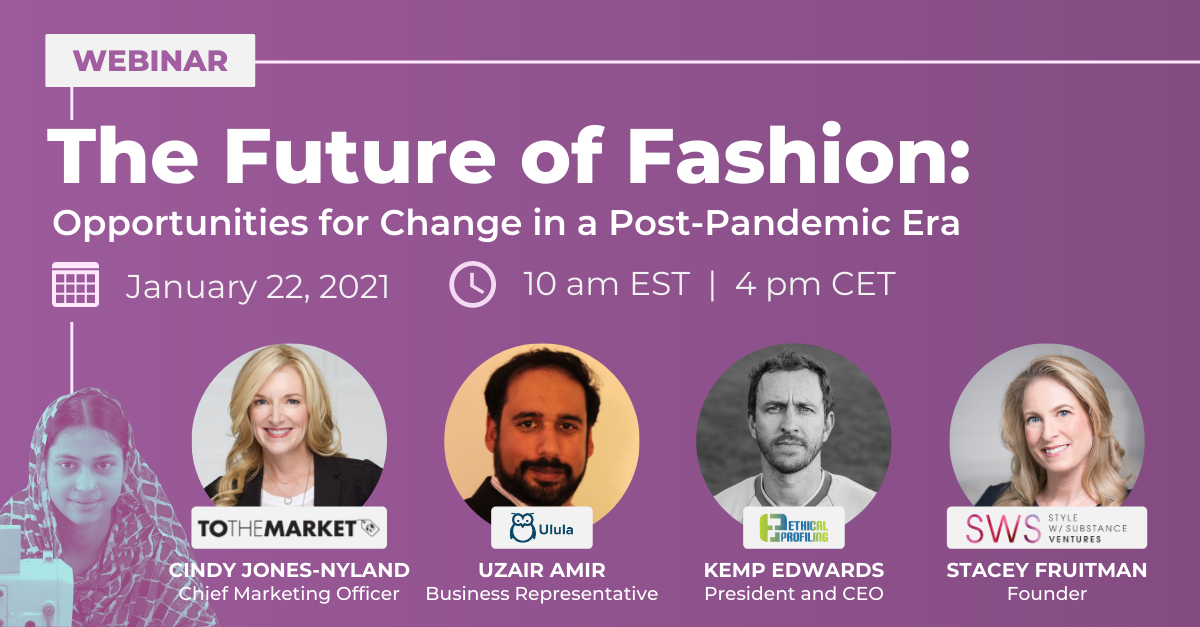On January 22nd, Ulula hosted a webinar on the Future of Fashion – Opportunities for Change in a Post-Pandemic Era. Moderated by Stacey Fruitman of Style with Substance, the webinar brought together industry leaders in fashion and tech, including panelists Cindy Jones-Nyland from TO THE MARKET, Kemp Edwards from Ethical Profiling and Uzair Amir from Ulula, for a discussion on how the pandemic created opportunities for change towards a more resilient, transparent and ethical fashion industry.
Over the course of the last year, Covid-19 has upended the fashion industry hitting both the demand and supply side. Some of the major trends that were discussed during the webinar include:
- Consumers are doing more of their shopping online, a trend evidenced by a large number of brick and mortar locations shutting down. While online purchases increased, consumer spending fell last year showing the continued drive for cheap over ethical goods.
- Serious logistical challenges resulted from cancelled orders sitting in warehouses while some high-demand items were unable to reach the consumers in time.
- Fairness and social justice issues emerged to the forefront during the pandemic. Poverty wages, worker heath and safety concerns, wage theft and child labour – all perpetual problems in the industry – were exacerbated during the crisis. Recent research by the ILO reveals that 77% of workers are still being affected by Covid-19 restrictions and there were unprecedented global employment losses of 114 million jobs in 2020, relative to 2019.
- Previously accepted methods used to monitor social compliance and labor conditions, such as in-person social audits and inspections, were challenging to implement during lockdowns and social distancing.
Strong supplier relationships help brands adapt and pivot
One of the greatest challenges that fashion companies faced at the height of the pandemic was the risk of cancelled orders and the subsequent scramble to re-allocate materials in the supply chain. Cancelled orders resulted in an estimated $16.2 billion loss for suppliers worldwide, of which the ripple effects would be felt by workers in lost wages. A successful pivot depends on close collaboration and alignment between all supply chain parties. Both Kemp Edwards and Cindy Jones-Nyland remarked that having very close relationships with their suppliers helped Ethical Profiling and TO THE MARKET successfully repurpose cancelled items and pivot production to new products, including personal protective equipment (PPE). Constraints caused by the pandemic inspired greater creativity and innovation for Ethical Profiling, which expanded its product lines to include facemasks made from organic and recycled materials and an innovative mask for use in the sports industry.
Innovating social audits, worker training and logistics through technology
In-person audits were challenging to conduct given travel restrictions and social distancing mandates, with audit firms being recommended to invest in digital programs, and some factories relying on skype walkthroughs to monitor social and environmental compliance. In response to increased demand for remote impact assessments, Ulula deployed remote assessments to 200,000 workers across 17 countries to measure the impacts of Covid-19 on worker well-being, PPE inventory, workplace health and safety policies, fair remuneration and more. While audits will remain a key business practice, the value of collecting feedback directly from workers via mobile apps or worker-centric reporting mechanisms is undeniable. This is supported by recent research on working conditions of 390 workers in food and footwear supply chains conducted by Oxfam which revealed that, despite countless audits, issues persist under the radar due to an absence of trust in existing reporting channels. Uzair Amir also highlighted the growing adoption of digital learning platforms for providing workers mobile-based training material in a post-pandemic world.
Cindy highlighted how TO THE MARKET’s technology platform, which serves as a connective tissue between brands and suppliers, was put to the test and improved upon due to pandemic related logistical challenges.
Ethical sourcing and stakeholder feedback must be a pillar of organizational strategy
Sustainability and ethical sourcing practices must be built into contracts and be embedded as a core pillar of organizational strategy and DNA. Upcoming mandatory human rights due diligence legislation is expected to better hold companies accountable for addressing human rights impacts of business operations by providing clear and actionable guidelines. Companies can also help educate brands and retailers, and ensure that their suppliers adhere to corporate ethical sourcing practices and policies. Kemp and Cindy underscored the value of bringing more stakeholders to the table so as to inform the company’s direction towards a more ethical sourcing model. The pandemic has disrupted supply chains and accelerated digitization. A safe and equitable recovery will need to put workers at the center to foster resilience and secure decent jobs to support the future of ethical fashion.
Watch the webinar in its entirety:
More about our panelists:
Style with Substance Ventures invests in and advises early-stage companies by creating partnerships and collaborative opportunities, and by supporting and promoting these initiatives. Their mission is to further sustainability in the fashion and lifestyle industries.
TO THE MARKET is the turnkey solution for ethical sourcing and manufacturing of apparel, home goods and, more recently, Personal Protective Equipment (PPE). They enable the supply chain of the future, in which manufacturing empowers people, especially women, protects the planet, and delivers quality products.
Ethical Profiling is a Canadian based company that consults, designs, sources and produces high quality, ethical, and sustainable products for private label partners as well as the retail and corporate sectors.
Ulula is an award-winning software and analytics platform that leverages digital technology to amplify worker and community voices. They provide companies with real-time insights to monitor and mitigate social risks and create responsible global supply chains across sectors.


